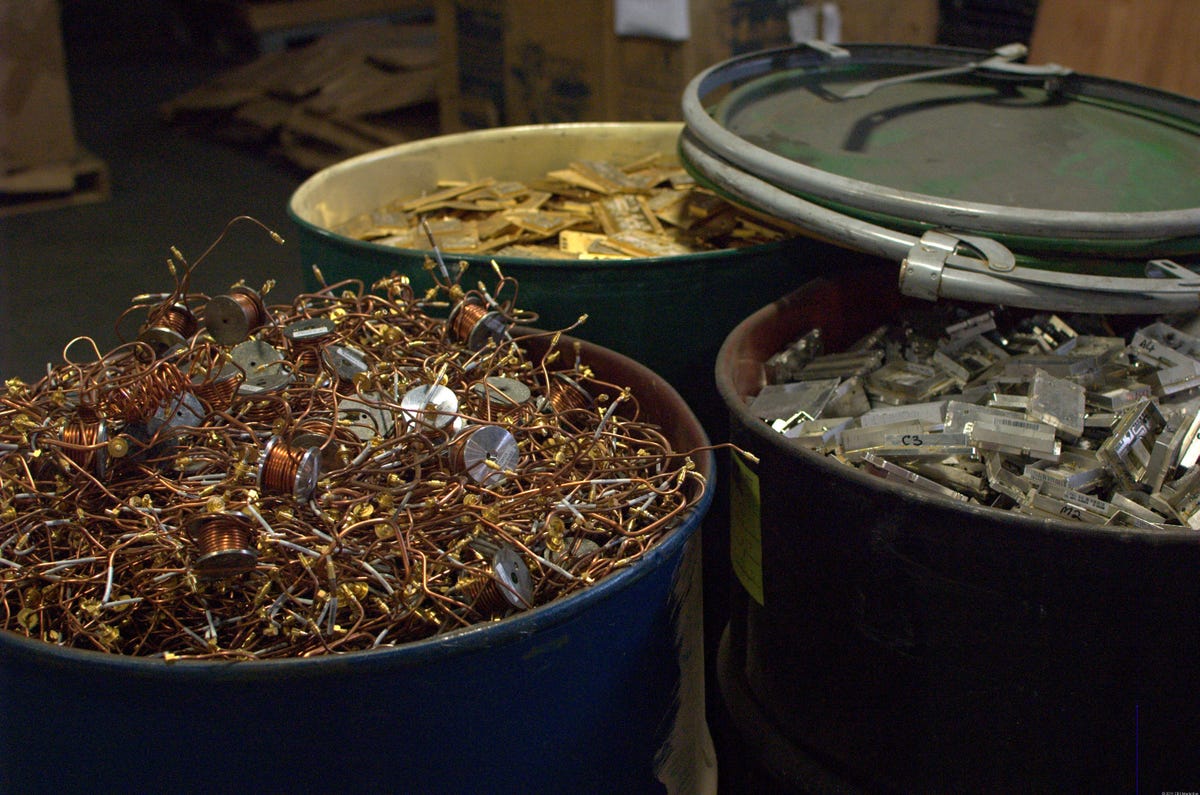'Demanufacturing' e-waste for profit (photos)
A small recycling company focuses on responsible electronics disposal by dismantling everything and pulling out high-value materials, including precious metals, in all manner of electronics.

Gold in them bins
E-waste is a growing problem in the U.S. and around the world. Some material found in electronics equipment can be highly valuable, such as the copper and gold-plated scraps seen here. Other gear, such as TVs and cathode ray tubes, doesn't contain as much value and is hard to recycle, particularly by manual processes.
This slideshow will show the operations of Metech Recycling in Worcester, Mass, which is an e-Stewards-certified recycler. That means all the material is handled in the U.S. and processed by a network of audited scrap handlers. Some companies have invested in high-tech automation to sort and shred e-waste, but Metech manually takes things apart which allows them to deliver a uniform product to metal smelters.
See related article, "Where electronics go to die, responsibly."
Telecom gear
The majority of Metech Recycling's scrap comes from business customers, such as telecom companies. Andrew McManus (left) from the company shows some circuit boards from a cell phone base station, like the one on the floor. When cell phone companies switch from 3G to 4G, for example, it means a refresh of a lot of electronics. Circuit boards contain a combination of valuable metals, such as copper and tin, that can be separated at special metal smelters outside the U.S. In general, household e-waste is less valuable because goods such as TVs don't have a lot of valuable materials and are harder to handle.
Gold plated circuit board
Notice the gold dotting this connector board, making it a very valuable (and heavy) piece of equipment to recycle. There's gold in ordinary cell phones, along with copper and silver, and the gold is easy to extract. Cell phones yield up to 150 grams (15.3 ounces) of gold per ton, compared to five grams per ton of ore, according to Urban Mining.
funnel cullet
Although there's some high-value metals in electronics, there's also plenty of equipment that has little value in the recycling stream. Shown here is glass from a cathode ray tube. It contains lead but not enough to recuperate, making it hard to recycle.
Demanufacturing line
There are sophisticated machines that use optical readers and magnets to sort electronic waste for later recycling. But Metech focuses on manual "demanufacturing" to get a cleaner stream and higher prices for its commodities. It can be a transient business, with some workers not staying very long, but it's steady work and some employees have been there for many years, according to Metech's Andrew McManus.
Hard drive cruncher
Hard drives come off the shredder. In addition to creating a commodity that can be sold, hard-drive destruction is a service that Metech Recycling offers. In some cases, employees need to witness data destruction of hard drives or tapes.
Battery recycling
One of the advantages of manually dealing with electronics rather than automatically shredding goods is to make sure that goods with hazardous materials don't get shredded and into the waste or recycling stream. For example, mercury or lead should be handled separately.
Metech recycles different types of batteries, but the metals that are recuperated might surprise you. For example, there isn't a commercial-scale operation for recuperating lithium from lithium ion batteries, according to Andrew McManus from Metech. Instead, the most valuable material is cobalt which is recycled.
Lead acid batteries
Lead recycling, compared to other metals, is done at a very high rate of 98 percent, according to Metech. In many cases, the processing facilities that receive metal scrap are very specialized. Metech also sorts compact fluorescent bulbs for recycling at a center in Pennsylvania where the mercury is distilled from the bulbs.
Wire sorting
Even wires are sorted according to thickness and type to get the most value from them. Copper a few years ago was about $1 per pound, but now it's up around $4 a pound, which can make a huge difference in the recycling business.
Plastic bales
Plastics from electronics are far less valuable than metals from the guts of equipment. The recycling business is very regional because of the significant cost of transporting goods. In some regions, Metech doesn't try to compete because the cost of transporting and handling goods would be too high, even for its fee-based business.
Museum pieces
At an electronics recycling center, you can imagine the types of vintage gear that comes through the doors here. In addition to this old audiovisual equipment is a mini museum of old computers, including Mac Classics, a Toshiba laptop from 1993, and one of the first "portable" IBM PC clones from Columbia Data Products from the mid-1980s.

